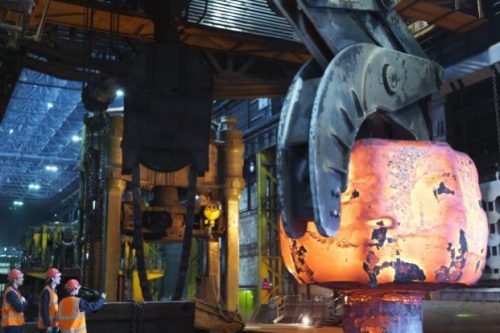Government cash for quest to find cleaner fuel source for steelmakers

Sheffield’s steelmakers could soon be switching to cleaner fuel, thanks to a pioneering new project.
Researchers from the University of Sheffield are working with partners from across South Yorkshire on the initiative, which could cut carbon emissions from Sheffield’s steel industry by 40%.
Engineers from the University’s Energy Institute and Advanced Manufacturing Research Centre (AMRC) are collaborting with energy company E.ON and Chesterfield Special Cylinders.
They are exploring ways of generating green hydrogen at Blackburn Meadows – a biomass-fuelled combined heat and power plant in Sheffield – which could then be used as a cleaner fuel source for the city’s steelmakers.
So far the project has learned that switching steelmaking to being fuelled by hydrogen could be commercially viable and sustainable over the longer term.
It could maintain the performance and product quality for manufacturers with carbon emissions 41.8% lower than if using natural gas.
That means the three manufacturers taking part in the initial trials – Sheffield Forgemasters, Forged Solutions and Chesterfield Special Cylinders – could save around 3,500 tonnes of CO2 each year.
The project has now been awarded £1m from the Government to explore the commercial and engineering needs of generating, transporting and using hydrogen, as well as developing the commercial offer to industrial customers.
If that is successful, the next stage will be a technical pilot project at the Blackburn Meadows site, with potential for future expansion if the project is taken forward to a full commercial demonstration.
The project is funded by the Department of Energy Security and Net Zero and its Net Zero Innovation Portfolio (NZIP) and is led by E.ON alongside Chesterfield Special Cylinders, Glass Futures, the University of Sheffield Energy Institute and Sheffield Forgemasters.
Professor Mohamed Pourkashanian, head of the University of Sheffield Energy Institute, said: “The work we’re doing for this at the University of Sheffield Energy Institute will help bring us a step closer to vital industrial decarbonisation and beyond.
“It is increasingly important to get the technological solutions we need to reduce emissions correct first time, so carrying out these detailed and industry-supported projects means we can test, scale and ultimately implement these alternative solutions as efficiently as possible.”
Chris Lovatt, chief operating officer for UK Solutions at E.ON, said: “Hydrogen will play a significant role in our energy future, mainly powering energy-intensive industries and long-distance transport.
“The first stages of our trial show the technology works and can support the industry’s needs for alternative fuels, as well as Sheffield’s wider sustainability ambitions.
“We know there are challenges to overcome before this becomes a viable solution for industry but the success so far has been rewarded by further funding from Government.”
Chris Walters, chief executive for Chesterfield Special Cylinder’s parent company Pressure Technologies, said: “We are happy to be a key partner in this project, exploring potential options to decarbonise forging processes at our Sheffield facility and showcasing our solutions for the safe and cost-effective storage and transportation of hydrogen.”
Rob Ireson, innovation and partnerships manager at Glass Futures, added: “We are excited to begin the next phase of this project to evaluate the performance of hydrogen and hydrogen-natural gas blends in steel manufacturing furnaces.
“Using data carried out in our Combustion Test Bed furnace in the first phase of research, which also formed the basis of the modelling carried out by the University of Sheffield, we can begin to apply the method for simulation and testing of hydrogen firing to furnaces at an industrial scale, to verify hydrogen’s effectiveness.”








